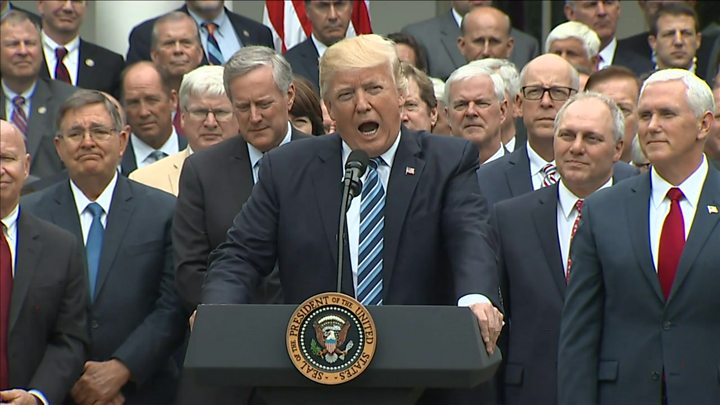 Image copyright
Image copyright
Reuters
Republican leadership hailed the passage of AHCA in the House as a victory
US lawmakers are awaiting a crucial analysis of the Republican healthcare plan passed in the House of Representatives earlier this month.
The non-partisan Congressional Budget Office (CBO) will provide a score for the American Health Care Act (AHCA).
The analysis will give lawmakers a sense of how much the plan will cost as well as how many Americans could lose coverage if it became law.
A score for a previous version found 14 million people would lose insurance.
But House Republicans have since revised the AHCA, after failing to even bring it to a vote in March.
The latest version of the measure narrowly passed the House and is expected to face challenges in the Senate, where lawmakers will pay close attention to Wednesday’s CBO score.
What will they be looking for?
Savings
The long-awaited score will confirm whether the bill hit the budget target of saving $2bn (£1.5bn) needed in order to move it forward in Congress.
In order to pass the bill through a process known as reconciliation, which allows the Senate to approve it with just 51 votes, the measure needs to save $2bn over the next 10 years. If it falls short, the House would have to vote again on a new bill that meets the budget goal or abandon the reconciliation process.

An earlier score found that the federal budget deficit would decrease by $150bn over the next 10 years, but recent changes are likely to alter the latest score.
Critics have also speculated that if the latest changes prompt more consumers to buy policies, they may be eligible for federal government tax credits that could end up costing the government more money than originally estimated.
Obamacare v Republican plan compared
The rise of Obamacare: Why is the ACA so popular?
Republican health bill: Winners and losers
Coverage
A previous CBO score of the Republican plan said it would result in 14 million people losing insurance in 2018, rising to 24 million without coverage by 2026.
Democrats have pointed to these figures as a reason to keep President Barack Obama’s 2010 Affordable Care Act, but Republicans contend they are rolling back an overreach by the federal government under Obamacare.
It is unclear how many Americans might lose coverage in latest plan, which allows states to waive Obamacare provisions such as the guarantee to provide healthcare to people with pre-existing conditions such as cancer or diabetes.
Republicans have argued that allowing states more discretion with Obamacare requirements would encourage insurers to offer a wider array of policies as well as lower rates.
But opponents say the plan allows insurance companies to charge sick people at significantly higher rates, ultimately pricing them out of the market.
Five big consequences of Trumpcare win
Patients tell their Obamacare stories
The new plan also allows states to opt out of providing essential benefits like emergency care and mental health, which critics say could hinder the quality of insurance.

AHCA limits federal funding for Medicaid, a government programme that covers low-income people.
Many of the 20 million Americans who gained coverage under Obamacare did so through the expansion of Medicaid.
Premium costs
Republicans say the latest version of the AHCA is aimed at fixing the rising premiums that many Americans complained about under Obamacare.
It would provide $8bn over five years towards coverage for sick people, including those with cancer, who could otherwise face higher costs under the new system.

But some health policy experts say the amount is not enough to cover the cost of coverage for sicker patients.
A previous CBO score found that premiums would eventually drop around 10%, but the figure is likely to change.
The older score noted that young people would see a drop in cost of premiums, but only at the expense of the elderly.
The Republican plan allows insurance companies to charge older people in their 50s and 60s up to five times as younger Americans.
The AHCA also drops the individual mandate requiring those who can afford it to have health insurance.
But Americans who have been without coverage for more than two months would face a 30% surcharge on a new policy.
Republican healthcare bill faces crucial score

